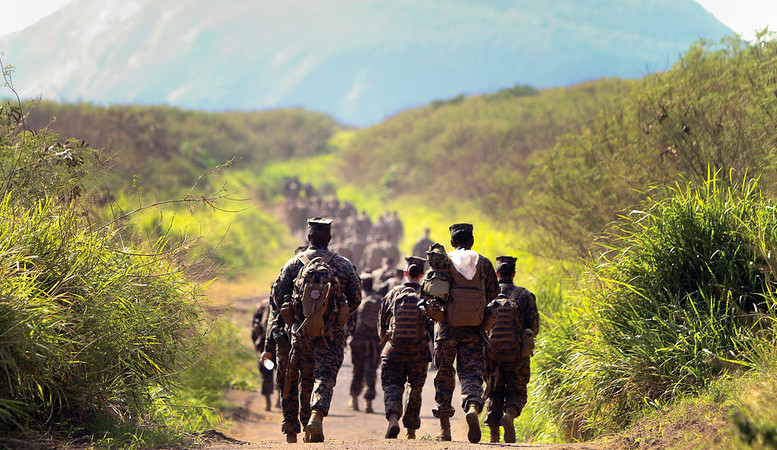for John W. Pritchard, Jr.
We should remember
all the dead of
the Sixth Marines.
They survived
the Battle of Okinawa,
its rot stench under
a “typhoon of steel,”
then they prepared to die
on a beach in Kyushu.
Instead, I am focused on
the hush of sliding doors
and a pair of bare elms,
two laced plumes
rising over the snow
in the flat cold,
their tangled branches
like bronchioles, vivisected,
exhausting the light.
I am exhausted.
Inside the hospital,
my grandfather lies
pale on white sheets,
his body held in
a position of least pain.
His hatchling mouth
pops open. He pecks
at the stale, dry air.
Because we were not
in the sixth Marines,
mom and I have trouble
with words. Dying, dead.
We avoid them by ironing,
bickering, washing sheets.
Because every word,
given the time, eventually
rhymes with silence,
Pa was a poet of silences.
Of course we asked
about the war—
mom begged him once
to explain what it meant
to be a China Marine.
Pa looked at his shoes
and said Well, I guess
we were Marines
and we were in China.
Not long after that,
he and I were down in
the basement workshop
puzzling some little repair.
He asked for the measure.
I handed it to him.
The rain had started
to leak into the sump.
It kicked on behind us,
purring rhythmically.
I hadn’t said a word.
The war, he said,
wasn’t how you imagine.
We laid in open graves.
We fired into the dark.
You couldn’t see
so you shot at nothing.
We hated the darkness
but we hated the light too.
Flares and fire. A plane
came down no more
than fifty yards away
from my position, sent up
a column of smoke
like we were in the Bible
wandering the desert.
We dug foxholes with short-
handled spades and waited.
The kid next to me got hit
over his left eye. Eighteen,
from West Virginia.
He died before his hands
could drop his rifle.
He’d never worn shoes
until boot camp. He died.
And that’s it. That’s all.
I didn’t die. So many
guys died, but I didn’t.
He stopped to clean his
glasses with the undershirt
he used for a rag, then
Pa laid the square and drew
a line across the board.
He measured the cut then
pulled the saw across
the grain in long, solid strokes.
I could hear the pant of pine
giving way beneath that saw
in the sterile untidiness
of Pa’s hospital room,
the wet breath collapsing
in his brittle chest,
the ward doors
opening and closing
in the bright cold sun.
He struggled to hold
a cup of water. He tore
the IVs out of his arms.
He refused to eat. He lay
half-naked on the bed with
swollen joints and sores,
wires and tubes branching
out of the riveted hull
of his whole history, rocking,
unevenly rocking and
his heart expectant still
as in the moment before
they’d all come ashore.
We should remember
all the dead
of the Sixth Marines.
We may never see their
like again; may we
never see their like again.
Image: “Marines, Through Fields of Green” licensed under CC 2.0.
- Daylight Savings - November 4, 2022
- Remembrance Day - December 7, 2020



This is amazing and beautiful. Thank you for writing and sharing it.